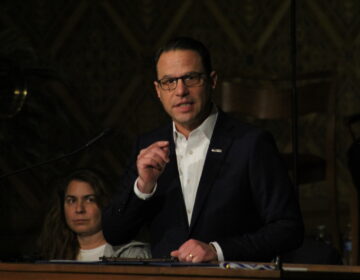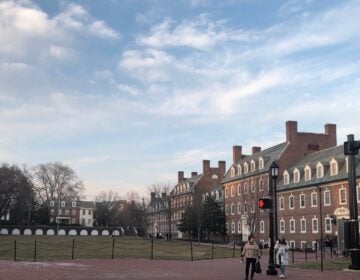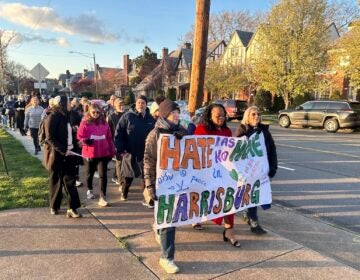An Elkins Park cantor and world-class composer recently passed away. His music lives on
Dr. Charles Stuart Davidson helped earn Congregation Adath Jeshurun a reputation as the “singing synagogue.” Ilana Davidson joined WHYY to remember her late father.
Listen 6:38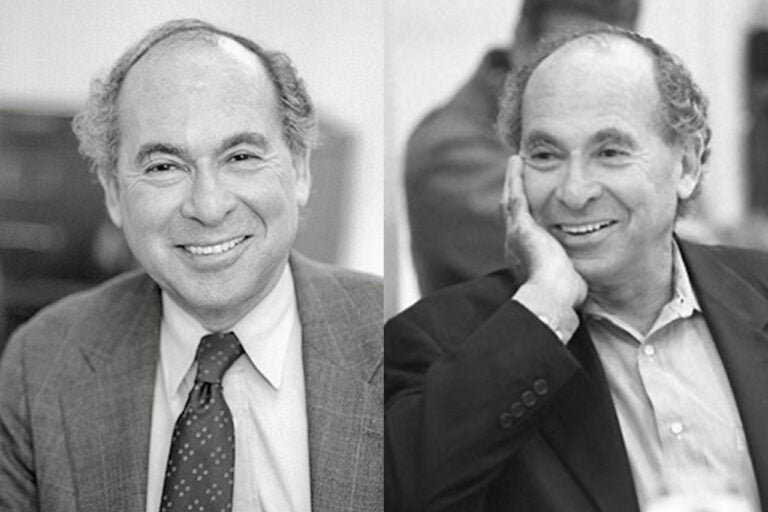
Cantor and composer Charles Stuart Davidson, (Milken Archive of Jewish Music)
From Philly and the Pa. suburbs to South Jersey and Delaware, what would you like WHYY News to cover? Let us know!
In the Jewish tradition, the cantor leads the congregation in song and prayer.
For decades, Dr. Charles Stuart Davidson served as the cantor at Congregation Adath Jeshurun in Elkins Park, outside of Philadelphia. While there, services became so vocal-rich, the synagogue earned a reputation as the “singing congregation.”
Davidson was a world-renowned composer and arranger of music. His 1968 song cycle, “I Never Saw Another Butterfly” sets to music the poems of Jewish children imprisoned in Czechoslovakia in the 1940s. Very few survived. That collection of songs received worldwide acclaim, with thousands of performances.
Cantor Davidson died just over a month ago at the age of 94. His daughter Ilana Davidson, now a classical singer and cantorial soloist in Nyack, New York, spoke with WHYY “Morning Edition” host Jennifer Lynn about the joy of his music-filled life.
___
Jennifer Lynn: Tell me about the role of the cantor. The rabbi is a spiritual leader. The cantor is a spiritual leader?
Ilana Davidson: Definitely. The cantor guides the congregation through musical prayer and inspires them both with his voice and his knowledge to be moved by the prayers through musical sense and also inspired to sing and also to be moved by how he or she recites those prayers with their voice and their sensitivity to the prayer.
JL: In the congregation in Elkins Park that you grew up in, it was a singing congregation. Tell me how unique that was.
ID: I think it’s incredibly unique. Many congregations kind of just sit there, whether they’re intimidated and they don’t feel comfortable singing, that’s a huge thing. Or maybe they don’t know what the cantor is going to do. My father really made it his mission to instill this enthusiasm for congregational singing. In our synagogue growing up, we had an organ and a professional small choir that was used not for a performance effect, but really used to inspire the congregation to sing and respond to feel moved.
JL: He sounds like an opera singer.
ID: He sure does. This excerpt is from the Saturday morning service. And it is praising God as the creator of the morning light. I love the musical setting of that and I agree, he does sound like a beautiful, high baritone opera singer.
[ music ]
JL: So little wonder you became a classical singer yourself.
ID: Total musical family. There was always music happening. Dad was composing until 3 in the morning, and you’d hear plinking of the keys lightly. Even “Happy Birthday” was arranged to a barbershop quartet and, in our case, sextet. And before the candles were being blown out, there was a whole discussion about who would be on what part, and “I don’t want to be doubled on my line,” and “I need the high part” and so, you know, break out the sheet music before “Happy birthday.” It was that kind of a house.
JL: Your father was one of the most frequently commissioned composers of congregational music and secular choruses. You performed your father’s music. We’re going to listen to a passage from the Epitaph for Yitzhak Rabin, a past prime minister of Israel. This was composed by your father. Tell me a little bit about it.
[ music ]
ID: My father was commissioned to set the very moving speech from the text of the eulogy from Rabin’s granddaughter, Noa Rothman. My father composed a cantata based around this speech, which includes Noa and her reading of the speech. It also includes baritone, a character who would represent Rabin, and a choir representing the Jewish people of Israel singing for peace.
JL: You recorded that special for us, didn’t you?
ID: Yes. We performed it live many times but the quality was just from far away, so I thought this might be a nice excerpt to include, especially at the end when she says, “I imagine angels are accompanying you now, and I ask them to take care of you because you deserve their protection.”
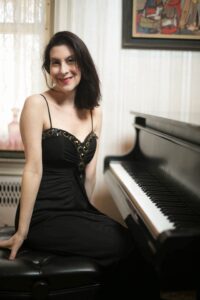
JL: Incredible. His music lives on.
ID: Yeah, his music lives on. His spirit is huge and the impact he had on so many people. He’s inspired so many people to become cantors and to get so much out of their musical prayer experience.
JL: Very good. Thank you.
ID: Thank you so much for having me.
JL: Ilana Davidson speaking with me about her father, the late Dr. Charles Davidson, who was the cantor of Congregation Adath Jeshurun in Elkins Park for many years. Family and friends are planning a celebration of his life for the upcoming spring.

Get daily updates from WHYY News!
WHYY is your source for fact-based, in-depth journalism and information. As a nonprofit organization, we rely on financial support from readers like you. Please give today.



